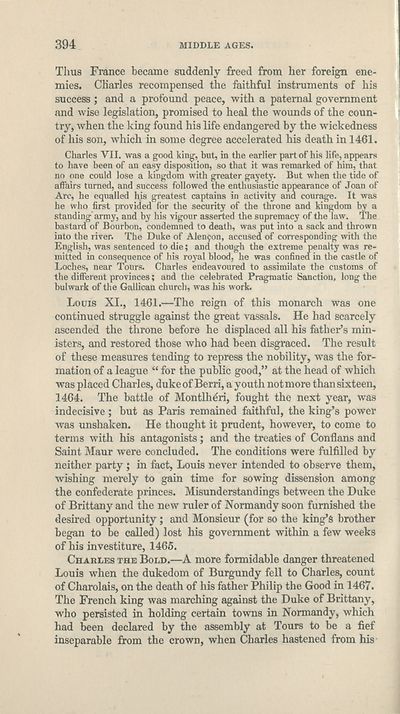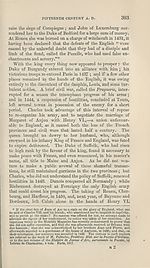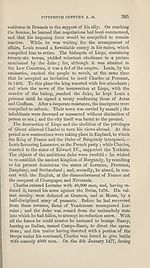Download files
Complete book:
Individual page:
Thumbnail gallery: Grid view | List view

394
MIDDLE AGES.
Thus France became suddenly freed from her foreign ene¬
mies. Charles recompensed the faithful instruments of his
success ; and a profound peace, with a paternal government
and wise legislation, promised to heal the wounds of the coun¬
try, when the king found his life endangered by the wickedness
of his son, which in some degree accelerated his death in 1461.
Charles VII. was a good king, but, in the earlier part of his life, appears
to have been of an easy disposition, so that it was remarked of him, that
no one could lose a kingdom with greater gayety. But when the tide of
affairs turned, and success followed the enthusiastic appearance of Joan of
Arc, he equalled his greatest captains in activity and courage. It was
he who first provided for the security of the throne and kingdom by a
standing army, and by his vigour asserted the supremacy of the law. The
bastard of Bourbon, condemned to death, was put into a sack and thrown
into the river. The Duke of Alenyon, accused of corresponding with the
English, was sentenced to die; and though the extreme penalty was re¬
mitted in consequence of his royal blood, he was confined in the castle of
Loches, near Tours. Charles endeavoured to assimilate the customs of
the different provinces; and the celebrated Pragmatic Sanction, long the
bulwark of the Galilean church, was his work.
Louis XI., 1461.—The reign of this monarch was one
continued struggle against the great vassals. He had scarcely
ascended the throne before he displaced all his father’s min¬
isters, and restored those who had been disgraced. The result
of these measures tending to repress the nobility, was the for¬
mation of a league “ for the public good,” at the head of which
was placed Charles, dukeof Berri, a youth not more than sixteen,
1464. The battle of Montlheri, fought the next year, was
indecisive; but as Paris remained faithful, the king’s power
was unshaken. He thought it prudent, however, to come to
terms with his antagonists; and the treaties of Conflans and
Saint Maur were concluded. The conditions were fulfilled by
neither party; in fact, Louis never intended to observe them,
wishing merely to gain time for sowing dissension among
the confederate princes. Misunderstandings between the Duke
of Brittany and the new ruler of Normandy soon furnished the
desired opportunity; and Monsieur (for so the king’s brother
began to be called) lost his government within a few weeks
of his investiture, 1466.
Charles the Bold.—A more formidable danger threatened
Louis when the dukedom of Burgundy fell to Charles, count
of Charolais, on the death of his father Philip the Good in 1467.
The French king was marching against the Duke of Brittany,
who persisted in holding certain towns in Normandy, which
had been declared by the assembly at Tours to be a fief
inseparable from the crown, when Charles hastened from his
MIDDLE AGES.
Thus France became suddenly freed from her foreign ene¬
mies. Charles recompensed the faithful instruments of his
success ; and a profound peace, with a paternal government
and wise legislation, promised to heal the wounds of the coun¬
try, when the king found his life endangered by the wickedness
of his son, which in some degree accelerated his death in 1461.
Charles VII. was a good king, but, in the earlier part of his life, appears
to have been of an easy disposition, so that it was remarked of him, that
no one could lose a kingdom with greater gayety. But when the tide of
affairs turned, and success followed the enthusiastic appearance of Joan of
Arc, he equalled his greatest captains in activity and courage. It was
he who first provided for the security of the throne and kingdom by a
standing army, and by his vigour asserted the supremacy of the law. The
bastard of Bourbon, condemned to death, was put into a sack and thrown
into the river. The Duke of Alenyon, accused of corresponding with the
English, was sentenced to die; and though the extreme penalty was re¬
mitted in consequence of his royal blood, he was confined in the castle of
Loches, near Tours. Charles endeavoured to assimilate the customs of
the different provinces; and the celebrated Pragmatic Sanction, long the
bulwark of the Galilean church, was his work.
Louis XI., 1461.—The reign of this monarch was one
continued struggle against the great vassals. He had scarcely
ascended the throne before he displaced all his father’s min¬
isters, and restored those who had been disgraced. The result
of these measures tending to repress the nobility, was the for¬
mation of a league “ for the public good,” at the head of which
was placed Charles, dukeof Berri, a youth not more than sixteen,
1464. The battle of Montlheri, fought the next year, was
indecisive; but as Paris remained faithful, the king’s power
was unshaken. He thought it prudent, however, to come to
terms with his antagonists; and the treaties of Conflans and
Saint Maur were concluded. The conditions were fulfilled by
neither party; in fact, Louis never intended to observe them,
wishing merely to gain time for sowing dissension among
the confederate princes. Misunderstandings between the Duke
of Brittany and the new ruler of Normandy soon furnished the
desired opportunity; and Monsieur (for so the king’s brother
began to be called) lost his government within a few weeks
of his investiture, 1466.
Charles the Bold.—A more formidable danger threatened
Louis when the dukedom of Burgundy fell to Charles, count
of Charolais, on the death of his father Philip the Good in 1467.
The French king was marching against the Duke of Brittany,
who persisted in holding certain towns in Normandy, which
had been declared by the assembly at Tours to be a fief
inseparable from the crown, when Charles hastened from his
Set display mode to:
![]() Universal Viewer |
Universal Viewer | ![]() Mirador |
Large image | Transcription
Mirador |
Large image | Transcription
| Antiquarian books of Scotland > Education > Elements of universal history on a new and systematic plan > (414) |
|---|
| Permanent URL | https://digital.nls.uk/127585108 |
|---|
| Description | Thousands of printed books from the Antiquarian Books of Scotland collection which dates from 1641 to the 1980s. The collection consists of 14,800 books which were published in Scotland or have a Scottish connection, e.g. through the author, printer or owner. Subjects covered include sport, education, diseases, adventure, occupations, Jacobites, politics and religion. Among the 29 languages represented are English, Gaelic, Italian, French, Russian and Swedish. |
|---|

